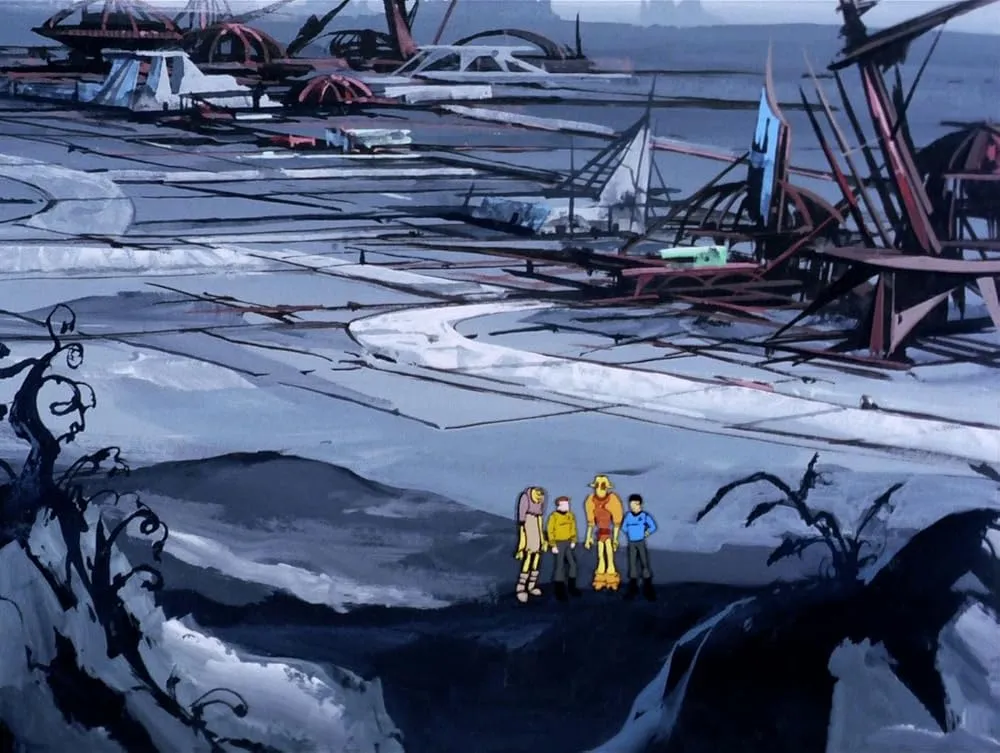
Albatross (S02E04)
Airdate: September 28th 1974
Written by: Dario Finelli
Directed by: Bill Reed
Running Time: 22 minutes
Star Trek: The Animated Series (1973–1974) occupies a curious niche in the franchise’s canon: it is often overshadowed by its live-action predecessors and successors, rarely invoked in pop culture discussions, and frequently dismissed as a lesser entry in the Trek pantheon. Its relative obscurity is underscored by the scarcity of its episodes becoming enduring cultural touchstones, even as its themes occasionally align with contemporary issues. Albatross, the second-season episode, exemplifies it. The episode’s narrative—centring on a medical controversy involving a vaccine gone tragically awry—could have resonated powerfully in the post-pandemic era had it been part of The Original Series or The Next Generation. The episode’s exploration of scientific accountability, societal panic, and the moral ambiguity of medical intervention makes it a prescient yet underappreciated work, particularly in hindsight.
Set in 2270 AD, Albatross opens with the USS Enterprise delivering medical supplies to Dramia, a remote planet inhabited by the Dramens, a humanoid species with distinctive angular facial features. Captain Kirk leads a landing party to greet the Dramens, only to be met with an unexpected demand: McCoy is arrested on charges of genocide, accused of causing a plague that devastated Dramia II, a colony of their people. The roots of this accusation trace back nineteen years prior, when McCoy administered a vaccine against the Saurian flu—a move that the Dramens now claim led to the collapse of their sister colony. Kirk, fearing the Dramens’ swift justice system will condemn his friend without due process, collaborates with Spock to investigate. After impounding a Dramen ship that trails the Enterprise, the pair beams down to Dramia II, discovering the colony’s ruins and a handful of survivors reduced to feral, zombie-like states. Among them is Kol-Tai, a survivor who retains his senses and recalls McCoy’s role in saving his life. Beaming Kol-Tai aboard as a potential witness, the crew soon finds themselves infected by the same plague. With Spock immune, he takes command, beams down to free McCoy from Dramen custody, and the doctor works tirelessly to synthesise a cure. The breakthrough comes when McCoy identifies an aurora phenomenon on Dramia II as the true cause of the plague, absolving him of blame and resolving the crisis.
Albatross is a middling entry in the Trek universe, neither groundbreaking nor entirely forgettable. Its simplicity aligns with the animated series’ mandate to cater to younger audiences, yet it offers enough dramatic tension to satisfy adult viewers within its brisk runtime. The episode is part of a subgenre within the franchise where a major character faces a trial, yet it diverges from courtroom theatrics to focus on mystery-solving and worldbuilding. The exploration of Dramia II’s desolate landscape and its eerie, half-converted survivors introduces a horror element uncommon in the typically optimistic Trek ethos. The Dramens’ design is visually engaging, a reminder of the series’ capacity to experiment with alien aesthetics in ways the live-action shows could not due to budget constraints. However, these strengths are tempered by the script’s lack of ambition: the plot unfolds in a predictable manner, and the resolution hinges on McCoy’s heroics rather than deeper philosophical inquiry.
The ruined world of Dramia II is the episode’s most compelling element. The depiction of skeletal survivors creates a haunting visual metaphor for societal collapse. Kol-Tai’s survival as a lucid individual adds narrative urgency, as his testimony becomes pivotal to exonerating McCoy. Yet the episode’s brevity—typical of the animated series’ 22-minute format—leaves the planet’s fate underdeveloped. The plague’s origins, while eventually tied to the auroras, are never fully explained beyond a vague scientific handwave. This abbreviated exploration robs the setting of its potential to become a haunting, multifaceted tragedy akin to Star Trek’s more celebrated episodes.
The episode’s structure adheres to a familiar Trek template: a crisis arises, the crew investigates, and the resolution hinges on the ingenuity of the protagonist (here, McCoy). While this formula ensures a satisfying arc, it lacks the surprise or depth that distinguishes the franchise’s best work. The revelation that the aurora phenomenon caused the plague is a neat twist, but it undermines the episode’s scientific credibility. This reliance on unexplained phenomena shifts the episode from “science fiction” to pure “fiction,” a choice that may frustrate viewers seeking logical consistency.
The most provocative aspect of Albatross is its treatment of McCoy’s prosecution for genocide. Accused of unleashing a plague through a vaccine, he embodies the tension between scientific authority and public distrust—a theme that resonates eerily with modern debates over mass vaccination during the pandemic. The episode’s premise—where a well-intentioned medical intervention backfires catastrophically—parallels real-world criticisms of rushed vaccine rollouts and their contested long-term effects. While the narrative absolves McCoy by pinning the blame on an external force (the aurora), it sidesteps the moral ambiguity of his actions. The Dramens’ anger, though portrayed as misguided, reflects a valid fear: that institutions entrusted with public health may prioritise expediency over thoroughness, with devastating consequences.
Albatross is a serviceable but unremarkable entry in Star Trek’s animated legacy. Its strengths lie in its eerie setting, inventive alien design, and thematic resonance with contemporary concerns about medical ethics. However, its predictable plot, rushed pacing, and reliance on unexplained phenomena prevent it from achieving greatness. For all its flaws, Albatross reminds us that even lesser-known Trek episodes can harbour ideas worth revisiting—particularly in an era where their themes have become all too relevant.
RATING: 5/10 (++)
Blog in Croatian https://draxblog.com
Blog in English https://draxreview.wordpress.com/
InLeo blog @drax.leo
LeoDex: https://leodex.io/?ref=drax
InLeo: https://inleo.io/signup?referral=drax.leo
Hiveonboard: https://hiveonboard.com?ref=drax
Rising Star game: https://www.risingstargame.com?referrer=drax
1Inch: https://1inch.exchange/#/r/0x83823d8CCB74F828148258BB4457642124b1328e
BTC donations: 1EWxiMiP6iiG9rger3NuUSd6HByaxQWafG
ETH donations: 0xB305F144323b99e6f8b1d66f5D7DE78B498C32A7
BCH donations: qpvxw0jax79lhmvlgcldkzpqanf03r9cjv8y6gtmk9